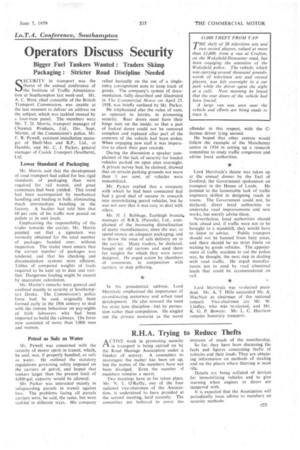Operators Discuss Security
Page 65

If you've noticed an error in this article please click here to report it so we can fix it.
Bigger Fuel Tankers Wanted : Traders Skimp Packaging : Stricter Road Discipline Needed
SECURITY in transport was the theme of the annual conference of the Institute of Traffic Administration at Southampton last week-end. Mr. A. C. West, chief constable of the British Transport Commission, was unable at the last moment to deliver an address on the subject, which was tackled instead by a four-man panel. The members were Mr. T. D. Morris, transport manager of Chiswick Products, Ltd., Div. Supt. Martin, of the Commission's police, Mr. F. R. Pywell, assistant installation manager of Shell-Mex and B.P., Ltd., at 1-Earrible, and Mr. C. J. Parker, general manager of Cusick Transport (Southern), Ltd.
Lower Standard of Packaging
Mr. Morris said that the development of road transport had called for less rigid standards of packaging than were required for rail transit, and great economies had been yielded. This trend had been accompanied by mechanical handling and loading in bulk, eliminating much intermediate handling in the factory. A haulier had told him that 60 per cent, of his traffic now passed on• pallets or in unit loads.
Emphasizing the responsibility of the trader towards the carrier, Mr. Morris pointed out that a signature was normally obtained for the total number of packages handed over, without inspection. The trader must ensure that thc , correct number of packages was tendered, and that his Checking and documentation systems • were efficient. Tables of computed weights of loads required to be kept up to date and verified: Dangerous loading might be caused by inaccurate calculation.
Mr. Martin's remarks were general and confined mainly to security at Southamptat Docks. The Commission's police force had, he said, originally been formed early in the 19th century to deal with the riotous behaviour on pay-nights of Irish labourers who had been imported to build the railways. The force now consisted of more than 3,000 men and women.
Petrol as Safe as Water
Mr. Pywell was concerned with the security of motor spirit in transit, which, he said, was, if properly handled, as safe as water. He outlined the statutory regulations governing safety imposed on the carriers of petrol, and hoped that tankers larger than the present limit of 4,000-gal. capacity would be allowed.
Mr. Parker was interested mainly in safeguarding parcels in transit against loss. The problems facing all parcels carriers were, he said, the same, but were tackled in different ways.. His company relied basically on the use of a singleentry consignment note to keep track of goods. The company's system of documentation, fully described and illustrated in The Commercial Motor on April 25, 1958, was briefly outlined by Mr. Parker.
He emphasized also the value of vans, as opposed to lorries, in promoting security. Rear doors must have their hinge nuts on the inside, so that a pair of kicked doors could not be removed complete and replaced after part of the contents of the vehicle had been stolen. When engaging new staff it was imperative to check their past records.
During the discussion a speaker complained of the lack of security for loaded vehicles parked on open sites overnight. A private survey had, he claimed, showed that on certain parking grounds not more than 5 per cent, of vehicles were immobilized.
Mr. Parker replied that a company with which he had been connected had had a good deal of success in research into immobilizing petrol vehicles, but he was not sure that it was easy to deal with oilers.
Mr. H. J. Babbage, Eastleigh branch* manager of B.R.S. (Parcels), Ltd., complained of the increasing disinclination of many manufacturers, since the war, to spend money on adequate packaging, and, to throw the onus of safe delivery on to the carrier. Many traders, he declared, bought up old cartons and used them, for weights for which they were never designed. He urged, action by chambers of commerce, in conjunction with carriers, to stop pilfering.
In his presidential address, Lord Merrivalc emphasized the importance of co-ordinating motorway and urban road development. He also stressed the need for strict lane discipline—but by persuasion rather than compulsion. He singled out the private motorist as the worst offender in this respect, with the Clicence driver lying second.
He hoped that other centres would follow the example of the Manchester centre in 1954 in setting up a research committee to study traffic congestion and advise local authorities.
Lord Merrivale's theme was taken up at the annual dinner by the Earl of Gosford, the Government spokesman on
transport in the House of Lords. He pointed to the lamentable lack of traffic engineers skilled in designing roads in towns. The Government could not, he declared, direct local authorities to undertake road improvements .arid new works, but merely advise them.
Nevertheless, local authorities should look ahead and, if traffic were not to be brought to a standstill, they would have
to listen to advice. Public transport should not be banned from busy areas, and there should be no strict limits on waiting by goods vehicles. The appointment of traffic wardens to aid the police was, he thought, the next step in dealing with road traffic. He urged manufacturersnot to send by road abnormal loads that could be accommodated on rail.
Lord Merrivale was re-elected president. Mr. A. T. Hills succeeded Mr. 'A. MacNair as chairman of the national council. Vice-chairmen are Mr. W. Lindley, who was te-elected,, and Mr. K. G. P. Bowyer. Mr. L. C. Harrison remains honorary treasurer.




































































































































